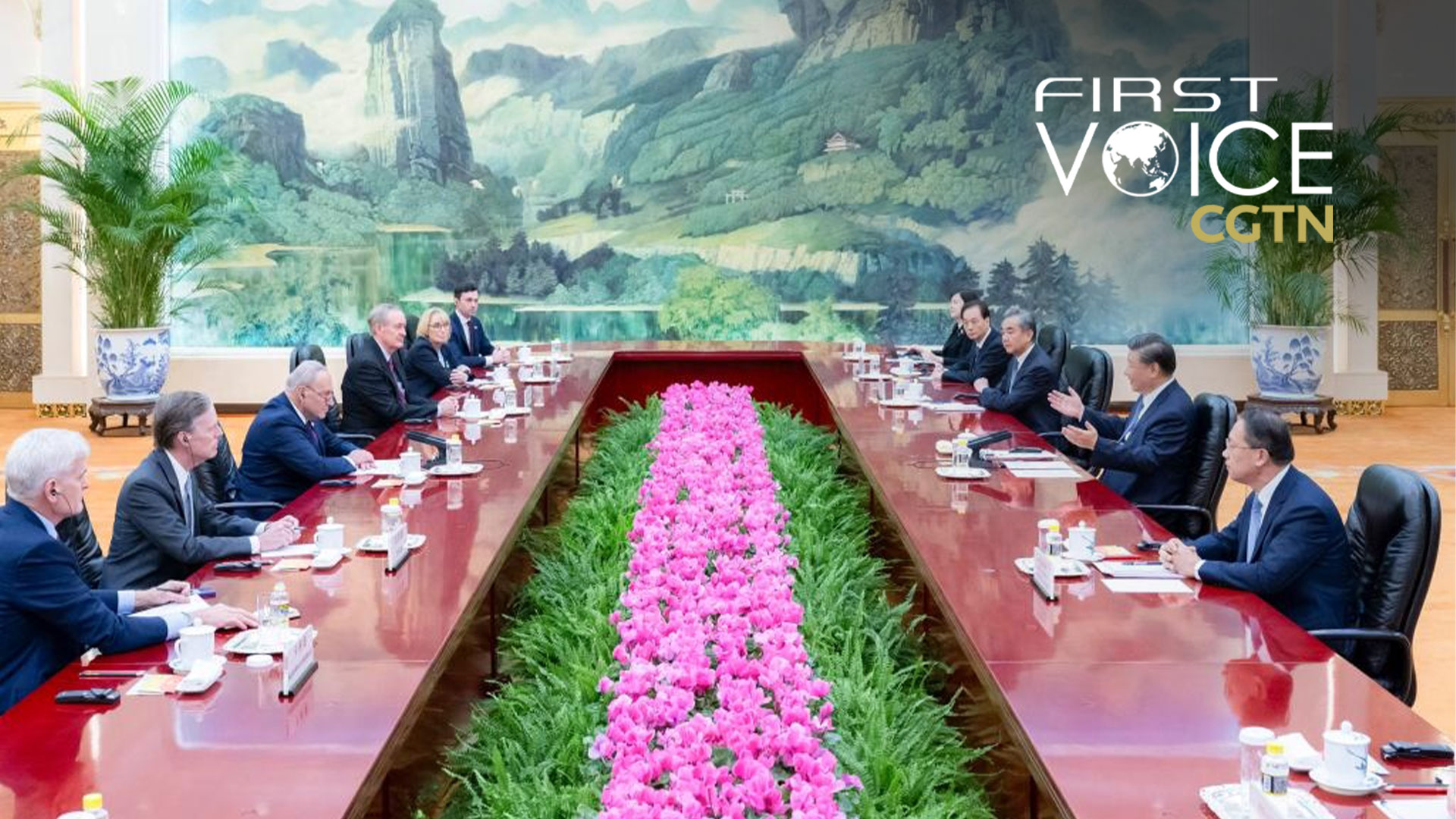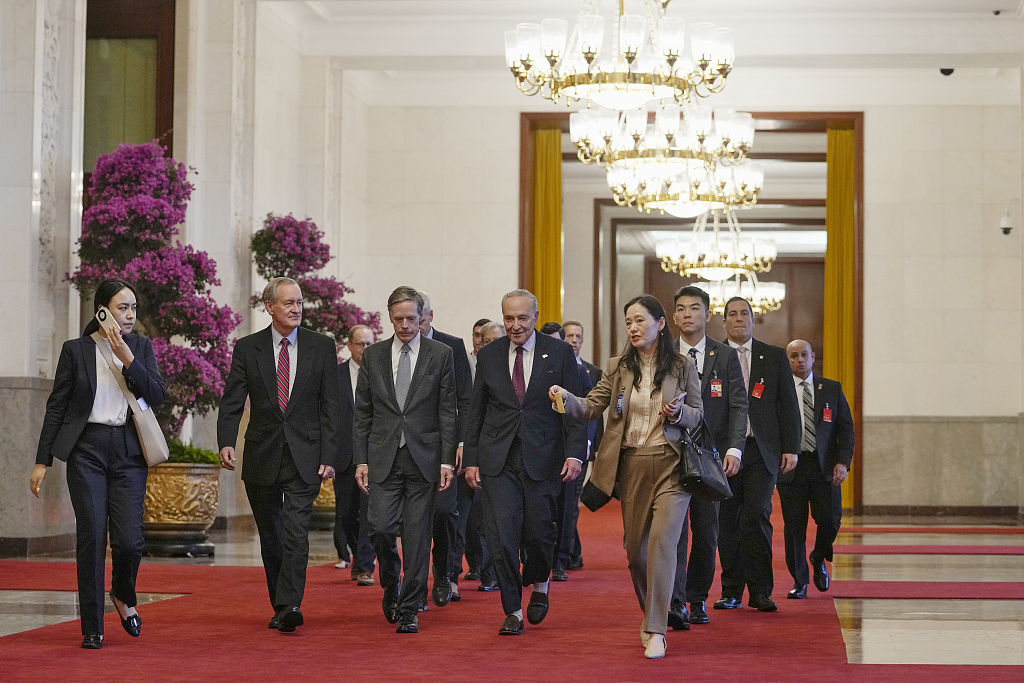
Chinese President Xi Jinping meets with a U.S. congressional delegation led by Senate Majority Leader Chuck Schumer at the Great Hall of the People in Beijing, capital of China, October 9, 2023. /Xinhua
Chinese President Xi Jinping meets with a U.S. congressional delegation led by Senate Majority Leader Chuck Schumer at the Great Hall of the People in Beijing, capital of China, October 9, 2023. /Xinhua
Editor's note: CGTN's First Voice provides instant commentary on breaking stories. The column clarifies emerging issues and better defines the news agenda, offering a Chinese perspective on the latest global events.
A bipartisan congressional delegation led by U.S. Senate Majority Leader Chuck Schumer concluded its trip to China this week. This is the latest in a series of high-ranking U.S. officials' visits to China, including U.S. Secretary of State Anthony Blinken, Treasury Secretary Janet Yellen, Commerce Secretary Gina Raimondo, and U.S. Special Presidential Envoy for Climate John Kerry. All have expressed the U.S.'s willingness to mend fences with China.
This visit of the U.S. lawmakers is indeed quite special, the first congressional visit in four years, with the status of visiting officials expanding from the executive branch to the legislative one – an undoubtedly positive sign for the China-U.S. dynamics. It's known that since U.S. President Joe Biden came into office, the Congress – the legislature in the U.S. political system – has been playing the role of "disruptor" in the stabilization of U.S.-China relations, taking an extremely tough stance on China.
Senator Schumer himself is known for his hawkish position on China policy. Not only has he repeatedly called for tough sanctions against China, but also actively introduced the CHIPS and Science Act and the Inflation Reduction Act, specifically targeting Beijing. In May 2023, the Schumer-led bill, "China Competition 2.0," was launched, to limit China's technological competitiveness and exploit it as a deterrence against China over the Taiwan question.
Of the visiting congressmen, Republican Senator Mike Crapo is also a well-known hardliner on China. However, in the visit to China, Schumer and other Senators expressed "goodwill," and said the U.S. did not "seek a confrontation with China," nor wanted to "decouple" from China, and was willing to strengthen communication and cooperation with China in the spirit of openness, frankness, and mutual respect.
The visit and the "goodwill" of the headliners are indeed good news for China-U.S. ties. Because of this, Chinese President Xi Jinping, when meeting with the delegation, particularly emphasized that China welcomed visits of more U.S. Congress members to gain a better understanding of China's past, present, and future, and also hoped the two legislatures would have more interactions, dialogues and exchanges to increase mutual understanding and make a positive contribution to the stabilization and improvement of the China-U.S. relationship.
In fact, over the past period, regardless of U.S.'s severe suppression and smearing campaign, China has always been keeping its door open for the friendly exchanges between the two nations. This is because China has stayed committed to the belief that the reconstruction of strategic mutual trust is only possible via strengthened dialogues and enhanced mutual understanding. And the rebuilding of strategic mutual trust is the very cornerstone of solid improvement in China-U.S. relations.

U.S. Senate Majority Leader Chuck Schumer walks through a hallway with his members of the delegation as they head for a bilateral meeting with Chinese President Xi Jinping at the Great Hall of the People in Beijing, capital of China, October 9, 2023. /CFP
U.S. Senate Majority Leader Chuck Schumer walks through a hallway with his members of the delegation as they head for a bilateral meeting with Chinese President Xi Jinping at the Great Hall of the People in Beijing, capital of China, October 9, 2023. /CFP
It is worth noting, however, that Schumer said China should provide a "level playing field" and "reciprocity" for U.S. entities operating in China. At a press conference on October 9, Schumer publicly accused the Chinese government of "restricting the ability of American companies to compete in an open and fair manner." This shows that the United States lacks sufficient trust in China.
China has always been committed to protecting the legitimate rights and interests of foreign investors and their enterprises in China. In 2020, based on the optimized existing foreign investment protection laws since the reform and opening-up, the Foreign Investment Law of the People's Republic of China officially came into force, providing institutional safeguards for foreign investment in China. Just in August 2023, China's State Council issued a statement outlining its guidelines regarding further optimizing the foreign investment environment and intensifying efforts to attract foreign investments.
For U.S. companies, as long as they operate in consistent with Chinese laws and regulations, they will certainly be protected by the Chinese government and have nothing to worry about. By contrast, some Chinese companies have been severely suppressed by the U.S. on trumped-up charges over the past few years. The fact that Schumer portrayed the U.S. to be the victim in China-U.S. ties fully demonstrated the serious trust deficit between the U.S. and China, a major obstacle to the future growth of U.S.-China relations.
Over the years, the action taken by the U.S. government has, in most cases, been inconsistent with its utterance, at the cost of its reputation and credibility. The Biden administration and its high-level officials visiting China have said a lot of fancy words, but their stance on China has become intensively tougher.
George Washington, the first president of the United States, once said, "…actions, not words, are the true criterion of the attachment of friends." For rebuilding mutual trust between the two states, actions lay the cornerstone, rather than words. Only by respecting each other's core interests and major concerns, observing the basic norms of international relations and the three joint communiqués between China and the United States, and putting into action the principle of not violating each other's bottom line, effectively and constructively managing conflicts and differences, can mutual trust between China and the United States be truly established, and the will of improving China-U.S. relations will not become a "castle in the air."
As an old Chinese saying goes, "A man without trust cannot be respected, a business without trust cannot prosper, and a country without trust declines." It is hoped that the visit of the U.S. Senators to China can be a real trip to enhance mutual trust.
The author Zhang Jiajun is an assistant research fellow at the Institute of American Studies, Chinese Academy of Social Sciences.
(If you want to contribute and have specific expertise, please contact us at opinions@cgtn.com. Follow @thouse_opinions on Twitter to discover the latest commentaries in the CGTN Opinion Section.)